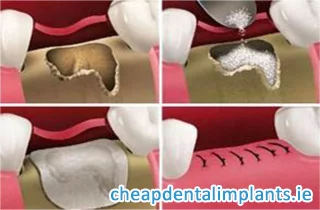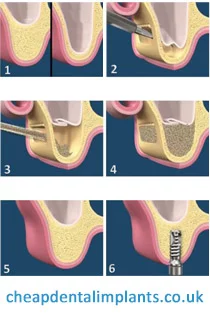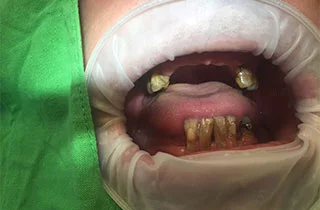Dental implants often provide a permanent and natural solution for replacing missing teeth. However, success depends on the patient’s individual circumstances and the chosen treatment method. Not everyone is immediately suitable for an implant – bone density is a crucial factor. In many cases, a bone graft is required before placing the implant. But is a bone graft always necessary? This article is aimed at patients who are considering dental implants and want to know when a bone graft is necessary, how the procedure is performed, and which factors influence its necessity and success.

In this article you will find answers to the following:
- What is a bone graft for dental implants?
- Procedure of a bone graft for dental implant
- Does everyone need a bone graft?
What is a bone graft for dental implants?
A bone graft for dental implants is a surgical procedure to add bone graft material to the jaw and thus create a stable foundation for an implant. In some cases, when a tooth is missing, bone loss can occur due to reduced stimulation of the area. However, this also depends on individual circumstances and the cause of the tooth loss. If there is not enough bone to support an implant, a graft may be required to restore the bone structure.
Types of bone grafts for dental implants
Autograft: Bone taken from the patient’s own body (e.g., chin, hip, or another part of the jaw). Allograft: Bone from a human donor from a tissue bank. Xenograft: Bone of animal origin, typically from bovine (cow). Alloplast: Synthetic bone graft material made from biocompatible substances.
Procedure of a bone graft for dental implant
 Before the dental treatment begins, an assessment is carried out using radiological and/or digital volume tomography (this is a special digital radiography imaging procedure developed for checking the bone in the upper and lower jaw as well as the teeth). As a result of the examinations, the doctor can determine whether a bone graft is necessary for a tooth. And if so, how much bone volume is needed. After that, the bone graft in the upper jaw can begin. Bone graft surgeries in the area of dental implants are becoming increasingly common and are considered routine procedures in many places, although their success depends on the quality of the medical practice and the patient’s individual situation.
Before the dental treatment begins, an assessment is carried out using radiological and/or digital volume tomography (this is a special digital radiography imaging procedure developed for checking the bone in the upper and lower jaw as well as the teeth). As a result of the examinations, the doctor can determine whether a bone graft is necessary for a tooth. And if so, how much bone volume is needed. After that, the bone graft in the upper jaw can begin. Bone graft surgeries in the area of dental implants are becoming increasingly common and are considered routine procedures in many places, although their success depends on the quality of the medical practice and the patient’s individual situation.
- The first step is the anesthesia. Then the doctor opens the gingival so that he could access the bone. Following this, he intersects a small “window” in the bone.
- The second step is the operation itself. The accumulated material must be removed to create a free space for the bone graft material to fill.
- As the final step, the dentist uses an artificial membrane, which helps the process of the wound healing. Then the gum where the dental bone grafting took place is sewed together.
- A healing period follows the surgery. After recovery, the patient and the dentist meet again for a consultation. In this way, the dentist can carry out the implantation. bone graft for dental implant aftercare
Can a dentist perform bone grafting and implant placement at the same time?
Yes, in some cases, a dentist or oral surgeon can perform a bone graft and implantation simultaneously. However, this depends on the extent of the bone loss in the jaw and the type of graft required.
When can bone grafting and implant placement be done together?
Simultaneous bone grafting and implantation is possible if the jawbone has sufficient primary stability (enough structure) to securely hold the implant during healing; the graft can contribute to strengthening. Generally, 4–5 mm of bone must be present below the sinus. During a tooth extraction, a small graft can also be placed directly next to the implant to prevent bone loss.
When is a bone graft first needed?

In cases of severe bone loss, a graft should be placed first, which should heal for several months (usually 3-6 months) before an implant is placed. This is performed when:
- The jawbone is too thin or too weak to support the implant.
- Major bone defects occur due to gum disease, injury, or long-term tooth loss.
- The patient requires a large graft, such as a sinus lift.
What percentage of dental implants need a bone graft?
In approximately 50% of cases, a bone graft may be required, although the exact percentage depends on the procedures used in the respective region as well as individual circumstances. The necessity of a bone graft depends on several factors, including:
How long the tooth has been missing: Bone loss begins soon after tooth loss, and the longer a tooth is missing, the greater the likelihood that a graft is required. Jawbone density: Patients with naturally thin or weak jawbones may need a graft for additional support. Location of the implant: In the upper jaw, especially near the sinuses, a bone graft is often required due to insufficient bone height. History of gum disease: Periodontitis can lead to significant bone loss, making a graft necessary before implantation. Trauma or infection: Previous injuries or infections that damaged the jawbone may require a graft to restore the bone structure.
Does everyone need a bone graft?
Not necessarily. If a patient has sufficient bone volume and density, no graft may be required at all.
How painful is bone grafting for dental implants?
During the bone graft surgery, the procedure is typically painless as it is performed under anesthesia or local anesthetic. However, during the healing process after the surgery, some discomfort and pain can occur. General anesthesia Most patients experience mild to moderate discomfort rather than severe pain.
Read more about the jawbone graft costs


